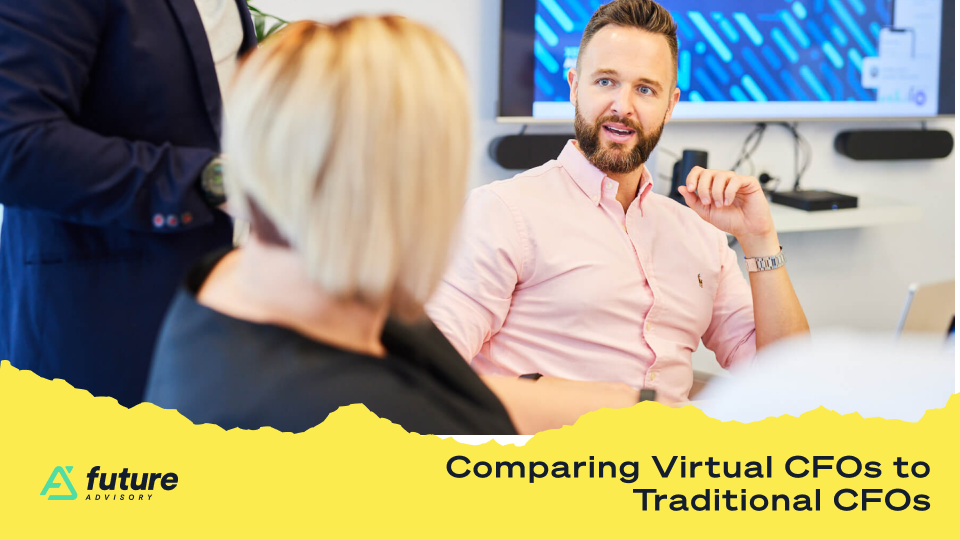What Is A VCFO?
Key Insights
- A Virtual CFO (VCFO) is a strategic financial partner capable of providing high-level guidance in areas such as budgeting, financial forecasting, cash flow management, and compliance.
- Cost-Effectiveness and Flexibility: Unlike traditional CFOs, VCFOs operate remotely, offering cost-effective financial expertise on a flexible, on-demand basis, without the need for a dedicated office space or high salary.
- Holistic Financial Support: In addition to strategic financial oversight, VCFOs offer mentorship and fresh, unbiased insights, which are invaluable for businesses of all sizes and stages of growth.
- Choosing the Right VCFO: Selecting a VCFO involves assessing your business needs, researching potential providers, evaluating their services and compatibility, and comparing cost structures to ensure a good fit.
Not every successful business person is necessarily, a ‘business person’.
That’s not a typo; it’s a fact.
Not everyone who has made millions in business has been a numbers nerd, a savvy strategist, or a metrics mogul.
And while all of those things are handy when it comes to managing a business’s finances, if they don’t come naturally to you to start with, don’t count on them magically appearing as soon as you register for an ABN.
Even if you are a business brain – unless you’re in the business of business like we are.
Crunching numbers, forward planning, and analytics are probably not things you have time to spend doing all day every day.
If you’ve said a quiet ‘Amen’ to yourself in the last 30 seconds, keep reading. A Virtual CFO (VCFO) could be your holy grail.

What does a VCFO do?
A Virtual CFO isn’t like the regular CFOs. They’re the cool CFOs.
Who are we kidding – they’re pretty similar to regular CFOs, but they don’t need a fancy corner office or a triple-figure salary. We don’t think you’ll catch a VCFO in a suit very often either.
Having a VCFO is like having a killer accountant, business coach, financial advisor, and strategist wrapped up into one person who is there to be as passionate about your business’s success as you are.
VCFO’s can also help with things like cash-flow, upscaling, financial forecasting, compliance, goal setting, and budgeting.
They’re also great mentors. VCFO‘s have been there and done that, and they’re still here to tell the tale. With their experience and knowledge, a VCFO can guide you through the rocky path that is business, so that you don’t have to keep learning things the hard way.
Comparing Virtual CFOs to Traditional CFOs

A VCFO isn’t your typical, suit-wearing, high-salary executive sequestered in a fancy corner office. Instead, they blend the roles of accountant, business coach, financial advisor, and strategist into one accessible, passionate advocate for your business’s success. They help navigate everything from cash flow and budgeting to compliance and financial forecasting, ensuring your business stays on the path to growth and stability.
Let’s delve deeper into how Virtual CFOs stack up against Traditional CFOs. The table below highlights the key differences to help you determine the best fit for your small business.
| Attribute | Traditional CFO | Virtual CFO |
| Location | On-site, typically requiring a dedicated office space | Remote, operates virtually, no dedicated workspace needed |
| Cost | High salary, often six figures, plus benefits | More cost-effective; part-time or fractional services available |
| Flexibility | Fixed hours, less flexibility for urgent needs | Highly flexible, often available on-demand |
| Skillset | Financial management, strategic planning | Comprehensive: financial oversight, strategy, mentorship, technology integration |
| Scalability | Limited to larger businesses with substantial resources | Suitable for businesses of all sizes, especially small and medium-sized ones |
| Technology Utilization | May use traditional financial systems | Advanced and cloud-based financial tools for real-time management |
| Perspective | Internal, may lack broad experience across industries | Wide-ranging experience with various industries, offering fresh, unbiased insights |
| Commitment | Full-time, long-term employee | Can be engaged on a project basis or ongoing as needed |
If you find yourself nodding along, realizing that a VCFO could be your business’s key to unlocking streamlined financial processes and strategic growth, it’s time to consider making this valuable addition to your team. With their holistic approach, a VCFO can be the collaborative partner you need to navigate financial complexities and drive your business forward.
Is a Virtual CFO right for my business?
Virtual CFO’s don’t have a predetermined list of tasks that they check through for every business they work with; they help you with what you need help with. This means that they’re beneficial no matter where you are in the business lifecycle.
For instance, your cash-flow might be pumping along nicely, but you’re not quite sure how to take the next step towards new growth. Or your strategy might be on track, but your bookkeeping might be balls up.
It’s a VCFO’s job to see where improvements can be made in a business’s finances and to collaborate with you to implement positive change. Even if you don’t know where or why things are going wrong, or if you want to enhance what you know is already working, this service will get things moving.
VCFO’s also offer an outsider’s perspective. You know how it feels when you’ve been staring at your computer screen for so long that the words you’re reading start to blur into one another? That fuzzy, clouded feeling can also happen when you spend too long in the nitty-gritty of your business without coming up for air.
A VCFO offers a fresh set of unbiased eyes that will help give you the clarity and honesty you need to move forward. This is particularly helpful in businesses with multiple directors, or family owned and operated.
Choosing the Right Virtual CFO for Your Small Business

Selecting the right Virtual CFO (VCFO) can be a game-changer for your small business, providing the expertise and strategic insight necessary to drive your financial success. Here’s a step-by-step guide to help you make an informed decision:
Step 1: Identify Your Business Needs
- Assess Areas of Improvement:
- Pinpoint specific financial challenges or goals (e.g., cash flow management, financial forecasting, compliance).
- Determine whether you need help with daily operations, strategic planning, or both.
- Set Clear Objectives:
- Define what you hope to achieve by bringing a VCFO on board.
- Establish measurable goals such as improving profit margins, reducing expenses, or scaling operations.
Step 2: Research Potential VCFO Service Providers
- Browse and Compare Firms:
- Look for firms offering VCFO services and compare their specialties, experience, and client reviews.
- Shortlist those that align closely with your industry and business needs.
- Check Credentials and Experience:
- Verify the qualifications of potential VCFOs (e.g., CPA, CFA).
- Examine their track record with other small businesses, paying attention to case studies or testimonials.
Step 3: Evaluate Services and Compatibility
- Understand Their Service Scope:
- Inquire about the range of services each VCFO offers (e.g., financial reporting, budgeting, strategic advice).
- Ensure their expertise covers your specific needs.
- Assess Technological Integration:
- Confirm if they use advanced financial software and tools that can integrate with your existing systems.
- Check whether they offer real-time financial insights and cloud-based solutions.
Step 4: Schedule Consultations
- Initial Meetings:
- Arrange consultations with your shortlisted candidates to discuss your business and gauge their understanding of your needs.
- Take note of their communication style, responsiveness, and willingness to listen.
- Ask the Right Questions:
- Inquire about their approach to solving your specific financial issues.
- Ask for examples of how they’ve helped similar businesses achieve their financial goals.
Step 5: Compare Cost Structures
- Review Pricing Models:
- Understand their pricing structure (e.g., hourly rate, monthly retainer, project-based fees).
- Make sure there are no hidden costs and that their fees are within your budget.
- Assess Value for Money:
- Compare the cost of VCFO services against the potential benefits and cost savings you expect to achieve.
- Consider how their expertise might lead to significant financial improvements over time.
Step 6: Make Your Decision
- Weigh Pros and Cons:
- Evaluate each candidate based on their expertise, experience, compatibility, and cost.
- Take your time to consider who aligns best with your business goals and culture.
- Formalize the Engagement:
- Once you’ve chosen the right VCFO, draft a formal agreement outlining their responsibilities, expectations, and terms.
- Ensure both parties are clear on communication protocols, deliverables, and performance metrics.
Did we just become best friends?
If a VCFO sounds like the answer to all of your business woes, or if you want a new business best friend (we’ll be yours if you’ll be ours!) – we’ve got you sorted. We can’t wait to crunch your numbers. Get in touch here.
FAQ
1. What are the main responsibilities of a Virtual CFO (VCFO)?
A Virtual CFO (VCFO) is responsible for providing strategic financial guidance, budgeting, financial forecasting, cash flow management, and compliance. Unlike a traditional CFO, a VCFO operates remotely, offering flexible and cost-effective services tailored to the needs of small and medium-sized businesses.
2. Can a VCFO help with small business bookkeeping?
While a VCFO typically focuses on high-level financial strategy and planning, they do not handle day-to-day bookkeeping tasks. For accurate financial record management, you should consider using a small business bookkeeping service.
3. How is a VCFO different from traditional accountants?
A VCFO offers more comprehensive and strategic financial oversight compared to traditional accountants, focusing on long-term financial planning and business growth. However, if you need specialized accounting assistance, such as tax preparation or compliance, our accountants in Melbourne can help.
4. Can a VCFO integrate with Xero accounting software?
Yes, many VCFOs are proficient with advanced accounting software like Xero. However, to carry out integration and expert management of your financial software, you might also consider working with our Xero accountants.
5. Does a VCFO offer carbon accounting services?
A VCFO primarily focuses on financial strategy and management. For specialized environmental accounting needs, such as measuring and managing your business’s carbon footprint, our carbon accounting services can provide the expertise you need.













